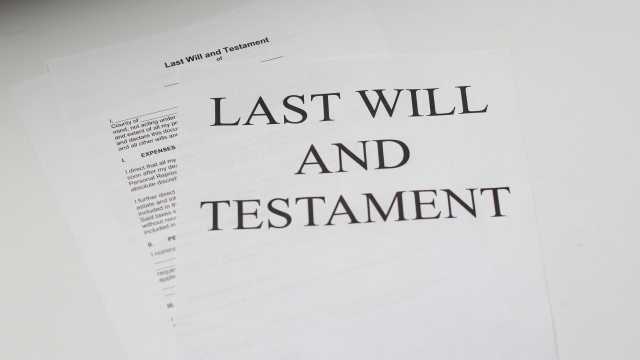Estate Planning
Distribution of trust assets to beneficiaries can get a little tricky, since there are multiple options to consider. Here’s what you need to know about how your funds and property will be passed to others when the time comes.

Stephanie Faris
•
Published March 17th, 2022
Table of Contents
Key Takeaways
A trust helps you securely transfer assets to your loved ones at a predetermined time.
You can choose to have all the assets transferred at once, on a fixed date, or at the trustee’s discretion.
The trustee transfers assets based on the instructions you provide in the trust document.
Trusts aren’t just for the wealthy. In fact, anyone can set assets aside for a loved one, whether it’s a child, a spouse, or a collection of beneficiaries, including charities and beloved pets. At some point, though, the assets will pass to each trust beneficiary as directed in legal documentation.
Distribution of trust assets to beneficiaries can get a little tricky, though, especially since there are multiple options. Here’s what you need to know about how your funds and property will be passed to others when the time comes.
How Does a Beneficiary Receive An Inheritance From A Trust?
The time to understand how do trust funds pay out is before you create the trust in the first place. You should know all your options and make sure the legal documents spell out exactly how you want things handled.
Disbursement of funds to beneficiaries is handled by a trustee, which is a third party you choose to oversee the trust. This could be an attorney or a trusted friend, but it’s a very important role. You need to appoint someone you trust to follow your wishes in a fair and neutral way. When the time comes, the trustee will either transfer the asset or move the funds from the trust to the bank account of the recipient.
How to Distribute Trust Assets Outright
When you’re setting up your trust, you need to decide how does a beneficiary get money from a trust. The least complicated way is to simply have the trustee issue the assets outright. This means that the property will be transferred without any stipulations or delays.
The big downside to this method is that it hands the money over all at once. Those dealing with less responsible beneficiaries sometimes don’t like this option because a recipient could spend the funds all at once. If you opt to go this route, you can find a sample letter to beneficiaries distribution of funds and customize it so that recipients know any personal wishes you have.
How to Distribute Trust Assets Over Time
A second way to handle trust fund distribution to beneficiaries is to stagger it over time. You might, for instance, have the funds go to a child in sections: one at the age of 25, one at 30, and one at age 35.
Trust distribution doesn’t have to be based on age. You can find trust distribution letter samples that show other options. You might find sample trust distribution language that issues part of the funds when someone gets married, with additional disbursements happening in increments over the months or years to follow.
How to Distribute at the Trustee’s Discretion
If you have a reliable trustee, you can turn revocable or irrevocable trust disbursements over to that third party. This is particularly beneficial if there will be distribution of trust funds after death. If you have a loved one who tends to be a bit irresponsible with money, you might direct your trustee to keep an eye on things.
It’s important to note that there is a downside to turning over administration to your trustee. Without your trustee following a carefully crafted group of preset family trust distribution rules, the trustee will be paid fees out of the trust, and that could lead less trustworthy trustees to drag their feet.
How Long Does a Trustee Have to Distribute Assets?
Obviously, if you have staggered or timed distribution, your trust assets can take a while to distribute. But each payment, whether outright, timed, or at the trustee’s discretion, must be made in a reasonably timely manner. How long does a trustee have to distribute assets? As a general guideline, the assets should be fully distributed within a year to 18 months of the date the funds were directed to move.
There have been cases of a trustee not paying beneficiaries, and when that happens, beneficiaries have the right to sue. First, look to state laws regarding how long trustees have to distribute, then determine whether it’s time to hire an attorney.
Tax Benefits Surrounding Trust Distribution
Distributing assets from an irrevocable trust brings a tax benefit to beneficiaries. Recipients won’t pay taxes on any funds they receive since the government will assume taxes were paid before they were moved into the trust. Any interest the funds earned while in the trust, though, will be taxed.
In some cases, though, inherited property can lead to a reassessment of that property. Distribution of trust assets to beneficiaries in California, for instance, can trigger a reassessment, so it’s important to note on the property transfer documents that it was a transfer, not a sale.
Final Thoughts
As you look over various trust distribution examples, keep your own unique situation in mind. A certified financial planner can look at your finances and beneficiaries and help you determine the best distribution plan for your trust.
Share this advice

Stephanie Faris has written about finance for entrepreneurs and marketing firms since 2013. She spent nearly a year as a writer for a credit card processing service and has written about finance for numerous marketing firms and entrepreneurs. Her work has appeared on Money Under 30, The Motley Fool, MoneyGeek, E-commerce Insiders, and GoBankingRates.
Intro to Estate Planning
Wills
Trusts
Divorce Considerations For Retirement
Estate Settlement
Share this advice

Stephanie Faris has written about finance for entrepreneurs and marketing firms since 2013. She spent nearly a year as a writer for a credit card processing service and has written about finance for numerous marketing firms and entrepreneurs. Her work has appeared on Money Under 30, The Motley Fool, MoneyGeek, E-commerce Insiders, and GoBankingRates.
Free Retirement Consultation
Still have questions about how to properly plan for retirement? Speak with a licensed fiduciary for free.



